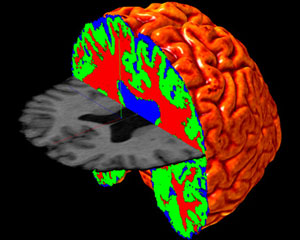Neuroimaging/Cognitive

The Neuroimaging/Cognitive FAR is designed for students pursuing a professional career in neuroimaging, either in clinical practice or in neuroscience research. The multidisciplinary approach provides training in both basic science and technological principles of modern neuroimaging methods, and in their application to the understanding of neurological function and neurological disorders. The Neuroimaging/Cognitive FAR is comprised of a set of selected core and elective courses designed to provide students with a firm grounding in the theoretical, conceptual, and practical issues involved in studying the human and non-human brain using neuroimaging methods - from the molecular to whole brain human imaging. Core courses allow students to gain an understanding of the physiological principles underlying the types of imaging modalities commonly used to examine micro- and macro- brain structure and function as well as psychologically induced changes in physiological signals. The FAR includes research design and data analysis. Participants will obtain hands-on experience with data acquisition, processing, statistical analysis, and visualization through the use of leading edge graphical workflow environments and image processing software packages. Core courses emphasize the consideration of brain structure and function using modern medical imaging (e.g. MRI, PET, OIS, etc) and related neural recording techniques (e.g. EEG). Across these intensive courses, students will gain a full appreciation of the various cognitive factors that influence patterns of brain activation measured with functional imaging methods (e.g. BOLD, fMRI and PET) as well as becoming familiar with the effects of disease on brain anatomy and integrity. Students will gain exposure to neural tissue imaging methods (e.g. light, confocal, molecular, and related microscopy approaches), their application, and comparative strengths and limitations. At the completion of the Neuroimaging FAR, it is expected that participants will be fully prepared to critique, design, and participate in conducting research studies using a variety of neuroimaging methods; appreciate potentials and limitations of current neuroimaging methods and techniques; better understand the broad range of expertise required in a brain imaging research program; and be positioned well for careers in neuroimaging laboratory research.
List of Faculty:
| Akin, Orkun | Role of neural activity in brain development and synapse formation |
| Bari, Ausaf | Invasive Human Brain Mapping for Reward, Addiction, Decision-Making and Motor Control |
| Bearden, Carrie | Neurodevelopmental Disorders; Cognition, Neuroimaging and Genetics of Mood Disorders and Psychosis |
| Bilder, Robert | Neuropsychology and Neuroimaging |
| Bisley, James | Cognitive Processing of Visual Information; Guidance of Eye Movements |
| Blank, Idan | Language comprehension and its relation to high-level cognition |
| Bookheimer, Susan | Functional Neuroimaging of Language and Memory |
| Clewett, David | Cognitive and neural mechanisms of emotional memory in humans |
| Cross, Kathryn | Neural mechanisms of gait and movement dysfunction in Parkinson’s disease & other movement disorders |
| Dapretto, Mirella | Neuroimaging/imaging genetics of language and social cognition in typical and atypical development (emphasis on adolescence and autism spectrum disorders); cultural neuroscience |
| Deters, Kacie | Risk factors for cognitive decline and dementia in Black individuals |
| Ellingson, Benjamin | Neuro-Oncology Neuroimaging & Neuroimaging in Complex Neuropathologies |
| Galvan, Adriana | Developmental Cognitive Neuroscience |
| Green, Shulamite | Sensory, cognitive, and affective neurodevelopment across clinical groups (e.g., autism, anxiety disorders, early life adversity) |
| Harper, Ronald | Neural Mechanisms in Sleep State |
| Hernandez, Leanna | Psychiatric genetics, neuroimaging, neurodevelopmental disorders (e.g., autism, schizophrenia, ADHD) |
| Ho, Tiffany | Adolescent stress, neurodevelopment, and depression |
| Hoftman, Gil | Understanding psychosis risk using neuroimaging and genetics |
| Hong, Weizhe | Neural Mechanisms of Social Behavior |
| Iacoboni, Marco | Non Invasive Human Systems Neuroscience |
| Knowlton, Barbara | Neural Substrates of Higher Cognitive Functions |
| Kumar, Rajesh | Neural control of autonomic, breathing, and cognitive functions. |
| Lavretsky, Helen | Understanding neurobiology of resilience and aging in mood and cognitive disorders |
| Liu, Zili | How People See and Why They See The Way They Do? |
| London, Edythe | Neuroimaging Brain Function in Addictive and Other Neuropsychiatric Disorders |
| MacKenzie-Graham, Allan | Understanding and preventing neurodegeneration |
| Mathews, Paul | Mechanisms of learning and memory, motor coordination |
| McCracken, James | Anxiety Disorders; Pediatric Psychopharmacology |
| Mendizabal, Adys | Study of social and structural determinants of health and its impact in neurological outcomes: Health Disparities in Huntington’s Disease and Adverse Childhood Experiences across different neurological conditions |
| Monti, Martin | Disorders of consciousness (Coma, Vegetative State, Minimally Conscious State); Language and thought; Neuroimaging; Brain Stimulation |
| Narr, Katherine | Applied Neurobiological Imaging |
| Nathanson, David | Research and drug development for malignant brain tumors |
| Petersen, Nicole | Translational neuroimaging and human neuroendocrinology |
| Rissman, Jesse | Cognitive and neural mechanisms of memory formation and retrieval in humans |
| Shams, Ladan | Multi-Sensory Integration; Perceptual Learning; Adaptation |
| Sicotte, Nancy | Neurodegenerative Disorders |
| Suthana, Nanthia | Neuromodulation and Neuroimaging of Human Learning and Memory |
| Uddin, Lucina | Brain connectivity and cognition in typical and atypical development |
| Zhou, Z. Hong | Studies structures of synaptic receptors, neuronal infections and neurodegenerative diseases by cryo electron microscopy (cryoEM). |

